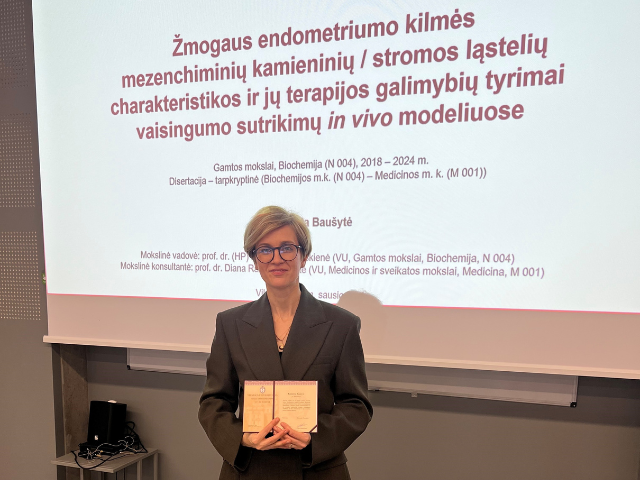Raminta Baušytė has defended her thesis entitled "Characterization of human endometrial mesenchymal stem/stromal cells and their therapeutic application in vivo models of fertility disorders" for the degree of Doctor of Science in Biochemistry.
The scientific supervisor is Prof. Dr. Rūta Navakauskienė.
Scientific consultant Prof. Dr. Diana Ramašauskaitė (Vilnius University, Medical and Health Sciences, Medicine).
Composition of the Dissertation Defense Board: Chairperson - Prof. Dr. Edita Sužiedėlienė (Vilnius University, Natural Sciences, Biochemistry); Prof. Dr. Daiva Baltriukienė (Vilnius University, Natural Sciences, Biochemistry); Prof. Dr. Gediminas Čepinskas (Centre for Critical Illness Research, Canada, Natural Sciences, Biochemistry); Prof. Dr. Janina Tutkuvienė (Vilnius University, Medical and Health Sciences, Medicine); Assoc. Prof. Dr. Jolita Zakarevičienė (Vilnius University, Medical and Health Sciences, Medicine).
Infertility is a significant global health issue. According to the latest data from the World Health Organization (WHO), approximately one in six individuals of reproductive age worldwide has experienced some form of fertility disorder at least once in their lifetime. WHO ranks infertility as the fifth leading cause of disability among young people globally.
Infertility treatment is one of the fastest-growing areas of medicine. Still, it is estimated that even today, 30–40% of couples remain childless within a five-year period from diagnosis, despite having tried all possible forms of assistance. One of the primary causes of this, and one of the most challenging areas in reproductive medicine, is disturbances in the implantation of the blastocyst in the endometrium, which are related to pathology in the latter. In such cases, stem cell therapy is increasingly being considered.
The results of scientific research confirm the potential application of mesenchymal/stromal stem cell therapy derived from the endometrium to address fertility disorders caused by endometrial pathology. The use of these cells in other experimental infertility models also lays the foundation for the development of new biotechnology solutions and the improvement of existing ones. At the same time, the multifaceted nature of the infertility problem has been highlighted, underscoring the necessity of collaboration among multidisciplinary specialist teams to achieve optimal outcomes in fertility disorder diagnostics and treatment.
 |
